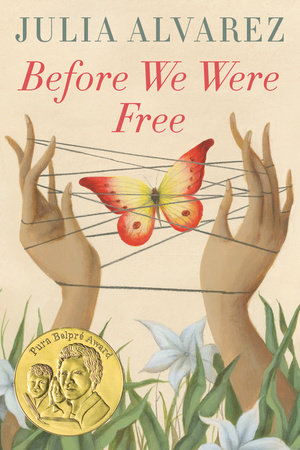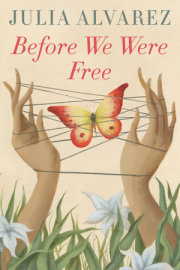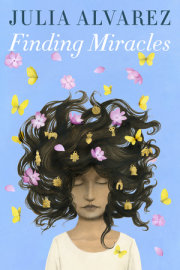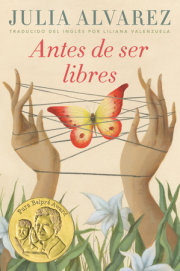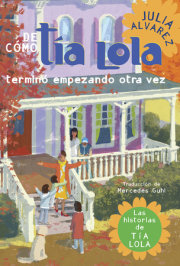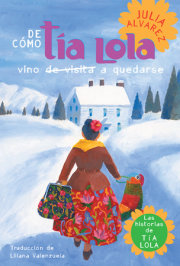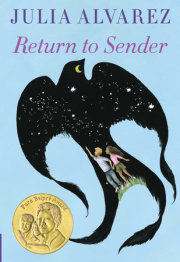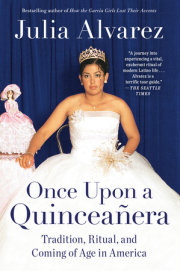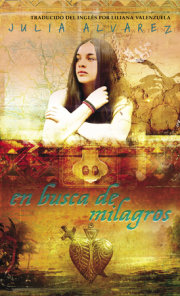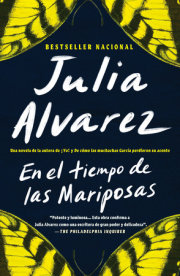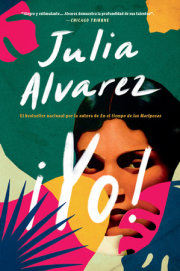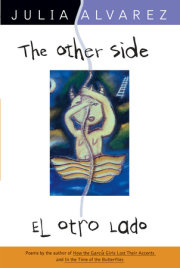Chapter 3
Now that the SIM are gone and the Washburns are living next door, Mami and Papi decide we can go back to school.
But first, Mami sits us down. "I don't want you talking about what happened with your friends, she warns.
"Why not?" I want to know.
Mami quotes one of Chucha's sayings, "'No flies fly into a closed mouth.'" The less said, the better. "And that includes talking to Susie and Sammy," Mami adds, eyeing Lucinda and me.
Lucinda has become friends with Sammy's older sister, just as I have with Sammy. Poor Mundín is stuck without a new friend. But he says he doesn't care. Papi is giving him extra responsibility, taking him to work the days we aren't in school. Some nights after supper, Mundín gets to drive the car up and down all the driveways that connect the houses in the compound.
"If anything happens to me," Papi says from time to time, ((you're the man of the house."
"If he wants to be the man of the house, he's going to have to stop biting his nails," Mami says, breaking the tense silence that follows such remarks.
The night before going back to school, I spend a long time picking out my outfit, as if I'm getting ready for the first day of classes. Finally, I settle on the parrot skirt Mami made me in imitation of the poodle skirt all the American girls are wearing. But even after everything is laid out, I feel apprehensive about going back. Everyone will be asking me why I've been absent for over two weeks. I myself don't understand why we weren't able to go to school just because the SIM were on our doorstep. After all, Papi still went to work every day. But Mami has refused to even discuss it.
I go next door to Lucinda's room. My sister is setting her hair in rollers. Talk about torture! How can she sleep with those rods in her hair? For her outfit, she also picked out her skirt just like my parrot skirt, but she insisted on a poodle when Mami made hers.
"Linda Lucinda," I butter her up. "What are we going to tell everyone at school? You know they're going to be asking us where we were."
Lucinda sighs and rolls her eyes at herself in the mirror. She motions for me to come closer. "Don't talk in here," she whispers.
"Why?" I say out loud.
She gives me a disgusted look.
"VAy?" I whisper in her ear.
"Very funny," she says.
I sit around until she's done with her rollers. Then she jerks her head for me to go out on the patio, where we can talk.
"If people ask, just tell them we had the chicken pox, Lucinda says.
"But we didn't."
Lucinda closes her eyes until she regains her patience with me. "I know we didn't have the chicken pox, Anita. It's just a story, okayr,
I nod. "But why didn't we really go to school?"
Lucinda explains that after our cousins' departure, too many upsetting things have been happening and that's why Mami hasn't
wanted us out of her sight. Raids by the SIM, like the one we had; arrests; accidents.
"I heard Papi talking about some accident with butterflies or something, I tell her.
"The Butterflies," Lucinda corrects me, nodding. "They were friends of Papi. He's really upset. Everyone is. Even the Americans are protesting."
"Protesting what? Wasn't it a car accident?"
Lucinda's rolls her eyes again at how little I know. "'Car accident" " she says, making quote marks in the air with her fingers, as if she doesn't really mean what she's saying.
“You mean, they were-"
"Shhh!" Lucinda hushes me.
Suddenly, I understand. These women were murdered in a pre, tend accident! I shiver, imagining myself on the way to school, tumbling down a cliff, my parrot skirt flying up around me. Now I feel scared of leaving the compound. "So why send us to school at all?"
"The Americans are our friends," Lucinda reminds me. "So for now, we're safe."
I don't like the sound of "for now," or how Lucinda makes those quote marks in the air again when she says "we're safe."
Mami is actually a lot calmer now that the Washburns have moved in. Not only is it nice to have the special protection of the consul next door, but the extra rent money is coming in handy. Construcciones de la Torre isn't doing well. Everything is at a standstill because of the embargo, whatever that is. We're having to cut corners and sell off our uncles' cars and the furniture from my grandparents' house from when Papito was making money. I offer to let Mami sell my brown oxfords and old-fashioned jumpers I don't like. But she smiles and says that won't be necessary just yet.
Lucinda and I aren't the only ones to make friends with our neighbors. Manii starts a canasta group to introduce Mrs. Washbum to other Dominican ladies and help her practice her Spanish. Two or three tables are set up on the back patio. The ladies chat in lowered voices. Every once in a while, the new maid, Lorena, comes around with a tray of lemonades or clean ashtrays. Although Mami is trying to save money, there's too much work keeping up with all the houses in the compound for just Chucha. So Mami has hired the young girl to help out. But we have to be extra careful what we say around her.
"Why?" I ask. "Because she's new?"
Mami gives me a look that has "Cotonita! " written all over it. After I told Mami that her nickname for me was really getting on my nerves, she promised to stop using it. But she still lets me know with her eyes when I'm speaking up too much. "Just be careful what you say," Mami repeats.
I guess you can't trust a maid who hasn't changed anyone's diaper in the family!
Actually, I can't really complain about being asked to keep secrets. Sammy and I haven't said a word about our discovery. Twice we've gone back to Tfo Toni's casita only to find the door closed and the padlock in place. But there have been fresh footprints leading to and from the casita and a pile of cigarette butts, as if Someone without an ashtray has thrown them out the window.
"Very fishy," Sammy observes, an expression which he says means that something strange is going on.
Our compound is crawling with fish, all right.
Copyright © 2002 by Julia Alvarez. All rights reserved. No part of this excerpt may be reproduced or reprinted without permission in writing from the publisher.

